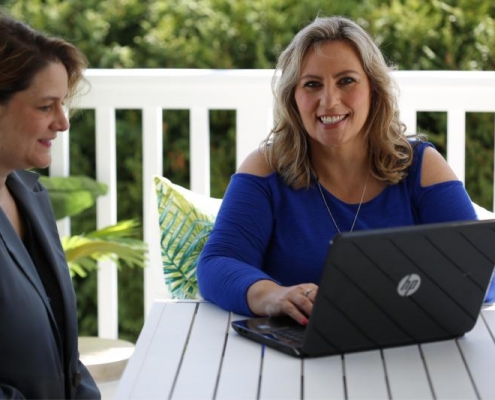Failure to Fortune: How a Female Business Coach Turns Setbacks into Strategy
Every entrepreneur faces moments when their carefully laid plans crumble, when market forces shift unexpectedly, or when a promising venture suddenly stalls. These pivotal moments define not just businesses, but the character of those who lead them. The difference between those who thrive and those who merely survive often lies in how they respond to adversity.
This transformation from failure to strategic advantage is where an experienced female business coach becomes invaluable. Drawing from personal setbacks and decades of entrepreneurial experience, coaches who have navigated their own business failures bring a unique perspective to helping others overcome obstacles. This article explores how one coach’s journey through professional setbacks became the foundation for a revolutionary approach to business strategy, empowering countless entrepreneurs to reframe their challenges as opportunities for unprecedented growth.
Understanding Setbacks in Business
What Constitutes a Business Setback?
A business setback is any unexpected obstacle or failure that disrupts normal operations or prevents achievement of planned objectives. According to the U.S. Bureau of Labor Statistics, approximately 20% of small businesses fail within their first year, and about 50% fail within five years. These setbacks can manifest in various forms:
- Financial losses or cash flow crises
- Loss of major clients or contracts
- Failed product launches or marketing campaigns
- Partnership dissolutions or team conflicts
- Market disruption by competitors
- Regulatory or legal challenges
How Do Setbacks Impact Business Owners Psychologically?
The emotional toll of business failure extends far beyond financial loss. Research from the Harvard Business Review indicates that 72% of entrepreneurs experience mental health challenges directly related to business stress. Setbacks trigger feelings of inadequacy, self-doubt, and fear of judgment from peers and family members. Many entrepreneurs report experiencing symptoms similar to grief, cycling through denial, anger, and depression before reaching acceptance. The pressure to maintain a confident exterior while processing internal turmoil creates additional strain, often leading to isolation and burnout.
Building resilience becomes essential for long-term entrepreneurial success. Resilient business owners demonstrate the ability to adapt quickly, maintain perspective during crises, and extract valuable lessons from failures rather than dwelling on losses.
The Journey of the Female Business Coach
What Background Prepared Her for Coaching?
With an MBA from a top-tier business school and over 15 years of entrepreneurial experience, this coach initially launched three separate ventures before finding her calling in business coaching. Her qualifications include certifications in organizational psychology, strategic planning, and leadership development. However, her most valuable education came from real-world failures that traditional academic settings never addressed.
Early in her career, she faced significant challenges including gender bias in male-dominated industries, difficulty securing funding compared to male counterparts, and the struggle to balance business ambitions with societal expectations.
What Major Setbacks Shaped Her Coaching Philosophy?
Her first startup, a technology consulting firm, collapsed after 18 months when her business partner withdrew unexpectedly, taking key clients and proprietary methodologies. This betrayal resulted in $200,000 in personal debt and a damaged professional reputation. Her second venture, an e-commerce platform, failed to gain traction despite significant investment, forcing closure after burning through savings and investor capital.
These experiences fundamentally shifted her understanding of business success. Rather than viewing failure as an endpoint, she began analyzing the patterns, decisions, and external factors that contributed to each setback. This analytical approach revealed that most business failures stem not from inadequate products or services, but from strategic misalignment, poor timing, or insufficient resilience systems.
Turning Setbacks into Strategic Opportunities
What Framework Transforms Failure into Strategy?
The coach developed the R.I.S.E. Framework, a four-phase methodology that helps entrepreneurs convert setbacks into strategic advantages:
Reflect: Conduct honest assessment of what went wrong without self-blame. This involves documenting events, identifying decision points, and separating controllable factors from external circumstances.
Investigate: Analyze market conditions, competitor actions, and internal processes to understand root causes. Data collection during this phase includes financial analysis, customer feedback, and operational metrics.
Strategize: Develop new approaches based on insights gained, incorporating lessons learned while maintaining core business vision. This phase emphasizes adaptability and creative problem-solving.
Execute: Implement revised strategies with built-in monitoring systems and flexibility for ongoing adjustments. Regular checkpoints ensure course corrections happen quickly when needed.
How Have Clients Succeeded Using This Approach?
One client, a boutique marketing agency owner, faced near-bankruptcy after losing her three largest accounts simultaneously. Using the R.I.S.E. Framework, she discovered her service model was unsustainable and her pricing structure undervalued her expertise. Within six months of implementing new strategies, she rebuilt her client base with better-aligned customers, increased her rates by 40%, and achieved profitability that exceeded her previous peak by 60%.
Another success story involves a retail business owner whose brick-and-mortar store struggled during economic downturns. Through coaching, she identified opportunities in her existing customer relationships and pivoted to a hybrid model combining online sales with exclusive in-store experiences. Her revenue increased by 85% within one year, and she expanded to two additional locations.
Empowering Others Through Coaching
Why Does Business Coaching Matter for Recovery?
Business coaching provides objective perspective when entrepreneurs feel overwhelmed by challenges. A skilled coach asks questions that uncover blind spots, challenges assumptions, and reframes problems as opportunities. According to the International Coach Federation, businesses that engage coaching services report an average ROI of 7 times their investment, with 86% of companies recouping their initial investment.
The coaching relationship creates accountability structures that keep entrepreneurs focused during difficult periods. Techniques include weekly goal-setting sessions, strategic planning workshops, and emotional intelligence development that helps leaders manage stress effectively.
How Can Organizations Build Resilient Business Cultures?
Creating resilience within organizations requires intentional culture-building that normalizes failure as part of innovation. Strategies include:
- Implementing “failure review” sessions where teams analyze setbacks without blame
- Celebrating pivots and course corrections as signs of adaptability
- Providing mental health resources and stress management training
- Establishing mentor relationships that connect less experienced team members with those who have overcome challenges
- Creating financial buffers and contingency plans that reduce panic during crises
A supportive environment encourages risk-taking and innovation because team members trust that mistakes become learning opportunities rather than career-ending events. This psychological safety drives creativity and problem-solving capacity throughout the organization.
Frequently Asked Questions
Q: How much does a female business coach typically cost?
The investment for business coaching services varies significantly based on experience, specialization, and engagement structure. Most coaches charge between $200 and $500 per hour for one-on-one sessions. Package deals typically range from $2,000 to $10,000 for three-month engagements, while comprehensive six-month or annual programs can cost $15,000 to $50,000. Many coaches offer initial consultation calls at no charge to assess fit and discuss specific business challenges.
Q: What qualifications should I look for in a business coach?
Look for coaches with relevant business experience in your industry, formal coaching certifications from recognized organizations like the International Coach Federation, and demonstrated success helping clients achieve measurable results. Request client testimonials, case studies, and references. The most effective coaches combine theoretical knowledge with practical experience, having personally navigated the challenges you currently face.
Q: How long does it take to see results from business coaching?
Most clients begin noticing mindset shifts and clarity within the first month of coaching, while measurable business results typically emerge within three to six months of consistent implementation. The timeline depends on the severity of challenges, the client’s commitment to implementing strategies, and external market factors. Coaching is a collaborative process that requires active participation and willingness to change established patterns.
Q: Can business coaching help with work-life balance?
Absolutely. Effective business coaches address the whole entrepreneur, recognizing that sustainable business success requires personal well-being. Coaching sessions often focus on time management, delegation strategies, boundary-setting, and systems that reduce the owner’s involvement in day-to-day operations. Many clients report improved relationships, better health, and increased enjoyment of their businesses after working with a coach.
Conclusion
Setbacks are inevitable in entrepreneurship, but they need not define your journey or limit your potential. The most successful business owners distinguish themselves not by avoiding failure, but by extracting wisdom from every challenge and using those insights to build stronger, more resilient enterprises. The transformative work of a business coach demonstrates that our greatest obstacles often contain the seeds of our biggest breakthroughs. By developing frameworks that systematically convert failure into strategy, entrepreneurs can approach challenges with confidence rather than fear, knowing that each setback brings them closer to sustainable success.
Consider your current business challenges not as signs of inadequacy, but as invitations to evolve. What lessons are hiding within your setbacks? What strategies could emerge if you viewed your obstacles through a different lens? Your next breakthrough might be waiting on the other side of your biggest challenge. Take the first step today by reaching out to someone who has walked this path before and can guide you through the transformation from failure to fortune.
***
Olivia Prateek












